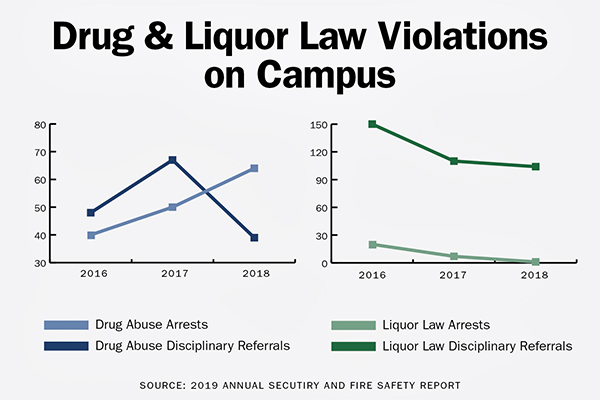Arrests for drug abuse violations on campus have increased over the past three years while arrests for liquor law violations have decreased over that time, according to the 2019 Annual Security and Fire Safety Report.
The report is published annually in accordance with the Clery Act, a federal law requiring federally-funded colleges to publish crime statistics around campus. UT Police Department Sgt. Robert Land said the decline in alcohol violation arrests is likely due to the 2018 establishment of the Austin Sobering Center, a place where law enforcement can take intoxicated people to sober up instead of being jailed.
“UTPD makes it a priority to find solutions other than arresting students for that violation,” Land said. “We’ll refer that to the Dean of Students so that they can do everything they can to help that person out.”
While liquor law violation arrests have decreased and liquor law referrals have increased from 2016 to 2018, the report says drug abuse violation arrests have increased. Drug violation referrals spiked in 2017 and decreased the year after, according to the report.
Land said the rates not aligning for drug abuse violations was “odd,” but they may be due to UTPD’s increased efforts to patrol areas surrounding campus.
“It’s probably having to do with our officers fielding more calls that aren’t just limited to the Forty Acres itself,” Land said. “That’s the most likely scenario I can think of.”
Texas has an alcohol amnesty law that protects minors from legal action in alcohol-related incidences, and UT’s amnesty policy protects students from disciplinary action for illegal substance-related emergencies, including drugs and alcohol. Land said UTPD can pursue cases through the University rather than criminally.
“If we come into contact with a student who has possession of marijuana and it’s a small amount and it’s something that we think is best handled administratively, we can refer them to Student Conduct or to Student Emergency Services,” Land said. “If we’ve got an option that keeps the community safe and pursues those cases in a way that potentially has better outcomes than pursuing it through the criminal justice system, then we will take that option.”
Chemistry senior Michelle Lopez said while it is good that students can be taken to the Sobering Center for alcohol-related incidents, there should be more support for students in drug-related incidents.
“I wish there was something like that for drug violations so (police wouldn’t) write everyone up for it, especially if they’re students,” Lopez said. “I’m sure a good amount of students have tried pot at UT, and I don’t think that writing them up is going to help them or the issue.”
Mark Smith, associate professor of American studies and history, said he has called for additional campus resources for drug abuse in the past, but they were not implemented. He said many drugs are more dangerous than they used to be because people can create new, stronger versions of existing criminalized drugs.
“Some of the drugs that are being used … can often be ordered on the internet because they’re not officially illegal yet,” Smith said. “You can’t keep up with that. If you criminalize one, then the next one is just another chemical bond away.”




















